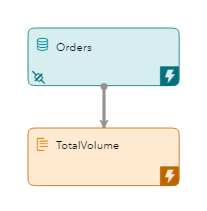In this repository, you'll see how to aggregate stock transactions using SAS Event Stream Processing (ESP) 6.2.
- How to use ESP functions to aggregate values in the Aggregate window
- How to execute a model on the ESP XML Server
- How to subscribe to a window with the file/socket adapter command
- How to subscribe to a window using ESP Streamviewer
Model Description, Editing, Executing, and Subscribing
Editing with SAS ESP Studio
The Aggregating Stock Transactions model is a simple XML model. It includes a Source window with an Input Data Connector and an Aggregate window to perform aggregate functions on the stream.
The model reads stock transactions for a set of stock symbols. The input stream includes the following for each transaction:
- Stock Symbol
- Number of Shares
- Price of the Stock
The model then aggregates the total number of shares traded for each symbol.
This repository includes the files required to execute the example and video demonstrations that include the following topics:
- Viewing and editing the model using a text editor
- Viewing and editing the model in SAS ESP Studio (optional)
- Executing the model using the SAS ESP XML Server
- Subscribing to the output using the file/scoket adapter command and writing the results to a comma seperated values (csv) file.
- Subscribing to the output using SAS ESP Streamviewer (optional)
SAS Event Stream Processing 6.2
Download the orders.xml and orders.csv files from the files folder on this site to your local computer.
The following are simple instructions for editing and executing the Aggregating Stock Trades model. The following high-level tasks are performed:
- View and Edit the Model with a Text Editor
- Start the Model on the XML Server
- Subscribe to the Output with a File/Socket Adapter
For instructions on using SAS ESP Studio to edit the model and SAS ESP Streamviewer to subscribe to the output, refer to the Instructions document.
1. View and Edit the Model with a Text Editor
Use the following steps to view and edit the orders.xml model in a text editor.
- Locate the
connectorelement and go to thepropertyelement with the attributefsnameon line number 49, approximately. The appropriate line is highlighted below:
<connector class='fs' name='publisher'>
<properties>
<property name='type'>pub</property>
<property name='fstype'>csv</property>
<property name='fsname'>orders.csv</property>
<property name='transactional'>true</property>
<property name='blocksize'>1024</property>
<property name='dateformat'>%d/%b/%Y:%H:%M:%S</property>
</properties>
</connector>- Edit the
fsnameattribute of to include the full path to your copy of orders.csv. Example:
<property name='fsname'>/home/sasdemo/orders/orders.csv</property>- Optional. Add a rate property to the connector to slow the events per second rate to 1000. Example:
<property name='rate'>1000</property>- Optional. Go to the
window-aggregateelement, add additional fields minimumPrice, maximumPrice, and averagePrice to theschemaelement. Add the appropriatefield-exprelements for the new fields. Example:
<window-aggregate name='TotalVolume'>
<schema>
<fields>
<field name='symbol' type='string' key='true'/>
<field name='quantityTotal' type='double'/>
<field name='minimumPrice' type='double'/>
<field name='maximumPrice' type='double'/>
<field name='averagePrice' type='double'/>
</fields>
</schema>
<output>
<field-expr>ESP_aSum(size)</field-expr>
<field-expr>ESP_aMin(price)</field-expr>
<field-expr>ESP_aMax(price)</field-expr>
<field-expr>ESP_aAve(price)</field-expr>
</output>
</window-aggregate>-
Save your changes.
-
Upload the orders.xml file from your local computer to the server directory you are using.
2. Start the Model on the XML Server
Use the following command line syntax to start the orders.xml model on the XML server:
$DFESP_HOME/bin/dfesp_xml_server -model file:///*yourpath*/orders.xml -pubsub 55555where
$DFESP_HOME/bin/dfesp_xml_serveris the command to start the XML server-model file:///*yourpath*/orders.xmlspecifies the full path to the model-pubsub 55555specifies the pubsub port
3. Subscribe to the Output Using a File/Socket Adapter
Use the following syntax to subscribe to the TotalVolume window using a file/socket adapter, and write the results to csv file totalvolume.out:
$DFESP_HOME/bin/dfesp_fs_adapter -C type=sub,url=”dfESP://localhost:55555/orders_proj/orders_cq/TotalVolume?snapshot=true”,fstype=csv,fsname=/yourpath/totalvolume.outwhere
$DFESP_HOME/bin/dfesp_fs_adapter -Cis the command to start a file/socket adaptertype=subindicates we are subscribing to a windowurl="dfESP://localhost:55555/orders_proj/orders_cq/TotalVolume?snapshot=true"specifies the URL of the TotalVolume window which includes the pubsub port, project name, continous query name, and name of the windowfstype=csvspecifies the file type as csvfsname=/*yourpath*/totalvolume.outspecifies the full path to the file created
You can use the tail -f command to view totalvolume.out being updated.
tail -f /yourpath/totalvolume.out4. Subscribe to the Output Using ESP Streamviewer
Refer to the Instructions document for detailed steps to subscribe to the output using SAS ESP Streamviewer.
The Aggregating Stock Transactions Using SAS Event Stream Processing 6.2 is not open for external contributions.
This project is licensed under the Apache 2.0 License.







